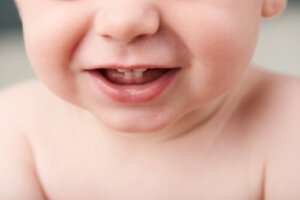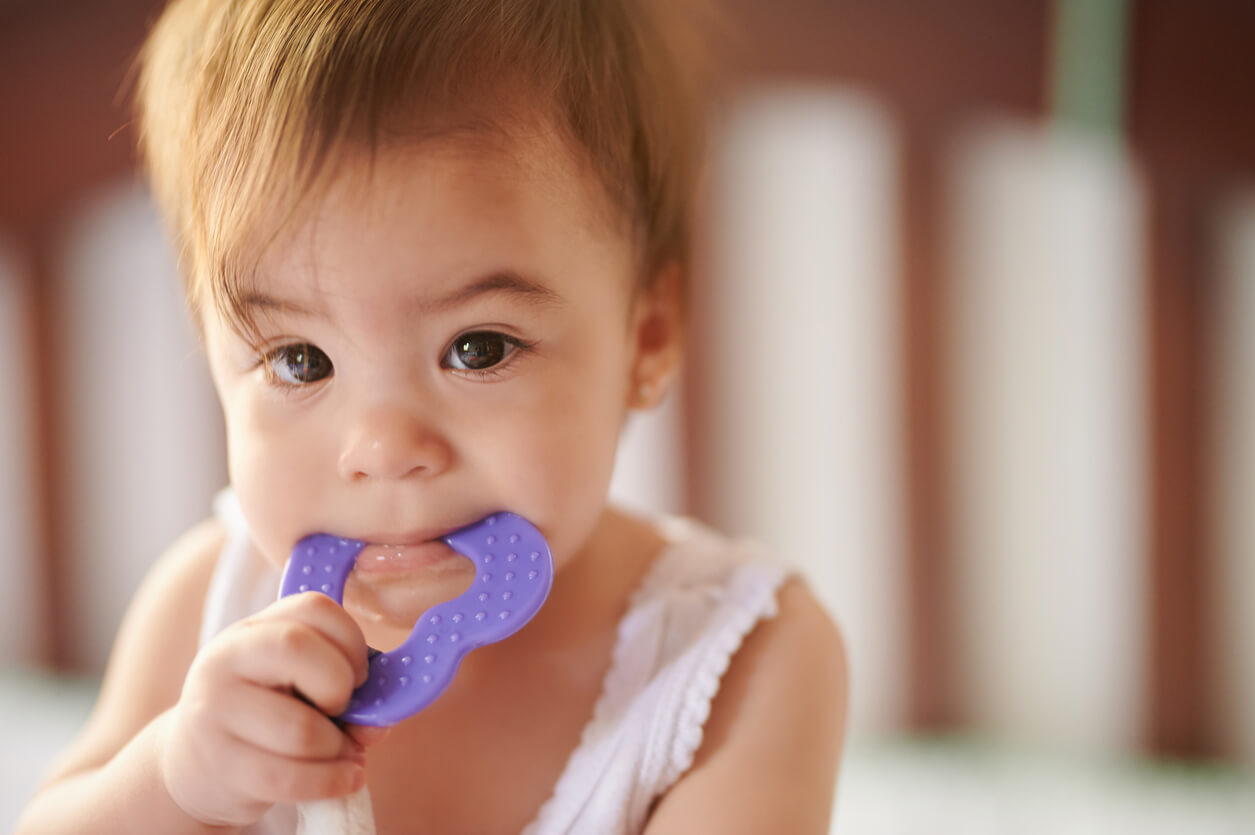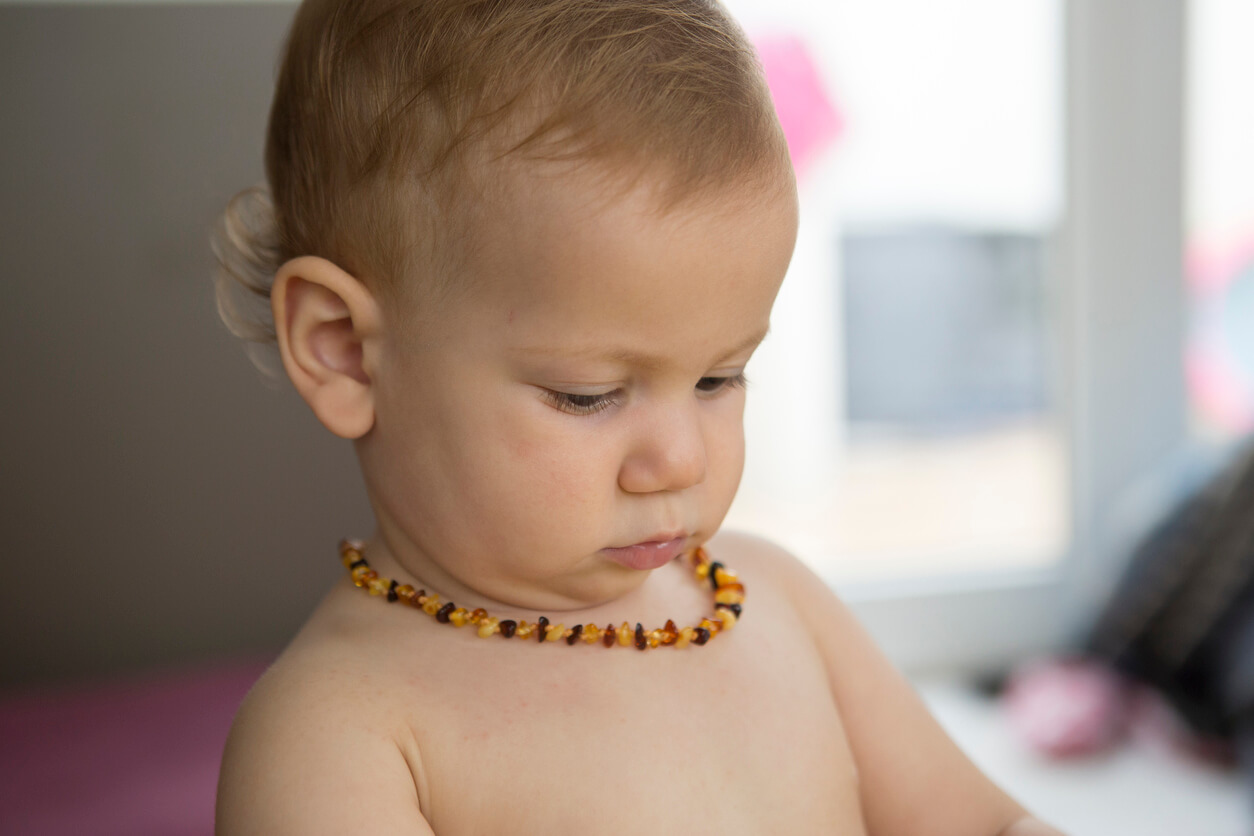What to Do (and What Not to Do) When Your Baby's First Teeth Erupt


Written and verified by the dentist Vanesa Evangelina Buffa
A baby’s first teeth erupt between 6 and 8 months of age, depending on the baby’s growth rate. Teething is a physiological and natural process that occurs progressively. From the first tooth in the mouth, more elements will begin to appear gradually. In this article, we’ll tell you everything you should do and those practices that you should avoid when accompanying your child during this stage.
During this period in which the new teeth appear in the baby’s mouth, parents should accompany the process to ensure the well-being of their children and the health of the new teeth. Doubts and myths surrounding teething are very common and can lead to confusion. Keep reading to learn everything you need to know.
Teething in babies
Teething’s a period that usually lasts from 6 months to 3 years of age. During this stage, teeth break through the gums to appear in the mouth and begin to perform their functions. In some children, this process causes no symptoms other than the appearance of the tooth at the gum line. But in other children, it’s usually a time of discomfort and irritation.
Although the eruption of teeth is a physiological process that doesn’t hurt, many parents and caregivers report that their little ones suffer from certain ailments. These are some of the symptoms that usually appear when the baby’s first teeth come in:
- The need to put objects in the mouth, bite, suck, and chew on them.
- Increased salivation and excessive drooling.
- Crying without apparent cause, irritability, and moodiness.
- Problems falling asleep and sleeping.
- Disgust at mealtime and lack of appetite.
- Slight increase in body temperature, but not considered a fever.
What to do when your baby’s first teeth come in
Since this is a physiological process, there’s nothing precise that you should do when your baby’s first teeth come in. However, if your little one feels irritable and uncomfortable, some measures will help to relieve them. At the same time, the new teeth should be with your child for most of their childhood. Taking care of them from the very first moment will prevent them from getting sick and stop them from fulfilling their functions. We’ll tell you more about these practices to take care of your baby when the first teeth appear.

Ease the discomfort when your baby’s first teeth erupt
If teething’s upsetting your baby, there are some simple methods that will help ease the discomfort:
- Use teethers: These are utensils designed for the baby to bite during the teething stage. They come in different sizes, shapes, materials, and textures. Just try to choose certified, safe, and toxin-free products.
- Offer your baby cold objects to bite on: The coolness on the gums will soothe inflammation and provide a pleasant sensation. Placing teethers, wet washcloths, or spoons in the refrigerator and then offering them to your child is a good alternative.
- Massage the gums: You can use a silicone finger brush, a clean cloth, or your own hands. Light pressure on the area usually soothes the discomfort.
- If your little one’s already eating, give them cool foods with different textures.
- If your baby’s very uncomfortable, consult your pediatrician about the possibility of using a pain reliever.
Preserve the health of the new teeth
The new baby teeth that appear in your baby’s mouth should accompany them through much of infancy. Having these healthy teeth will allow them to eat, talk, interact and smile normally. In addition, these elements help the correct development of the jaws and the proper positioning of the permanent teeth in the future. Therefore, it’s very important to keep them healthy until they fall out on their own.
Keep in mind that baby teeth can suffer from cavities from the moment they erupt. Therefore, taking care of your diet and eliminating bacterial plaque are aspects that you’ll have to take care of. As soon as the first tooth appears, you should start brushing it. Use a soft-bristled toothbrush and a small amount of fluoride toothpaste (the size of a grain of rice). It’s also important to clean the gums and tongue. Ideally, you should practice this routine twice a day.
Taking care of your little one’s diet
Dietary care is another factor to consider. It’s important to provide your little one with a varied, nutritious, and healthy diet that favors their correct growth and development. Also, you have to avoid offering ultra-processed foods with high sugar content, such as sweets, candies, pastries, and soft drinks. Otherwise, the bacteria in the mouth ferment these simple carbohydrates and produce the acids responsible for tooth destruction and the appearance of cavities.
Visiting a pediatric dentist
Another action that benefits the care of the baby’s first teeth is to schedule a check-up with a pediatric dentist. It’s best to make the first visit before the child’s first birthday and continue with checkups every six months. With regular checkups, the dentist will monitor the general condition of the mouth, the growth of the jaws, and the process of tooth eruption. If any problems arise, they can be diagnosed and solved at an early stage. At the same time, frequent visits to the dentist allow your child to become more accustomed to the dental environment.

What not to do when your baby’s first teeth erupt
There are many myths, beliefs, and popular opinions that parents may hear when their baby’s first teeth come in. Ignorance or frustration due to the irritability of the little ones can lead some parents to implement certain measures that aren’t recommended by professionals and can even be dangerous. So that you don’t make these mistakes due to lack of information, we’ll tell you what you shouldn’t do when your baby’s first teeth erupt:
- Don’t offer frozen teethers or foods. Extreme cold can cause injury or burns to the mouth.
- Never cut your child’s gums to “help” the tooth come in. This practice can cause serious infections. Teeth erupt on their own and at their own pace. If in doubt, it’s best to consult a dentist.
- Avoid attaching objects to the baby’s neck. For example, teethers, chewing toys, etc. This can lead to accidental strangulation.
- Amber necklaces should be avoided because they can cause choking or strangulation.
- Never medicate the child without the advice of a pediatrician.
- Don’t use homemade or homeopathic ointments or rub alcohol on the gums of small children.
- It’s counterproductive to use topical or tablet analgesics and anesthetics in infants’ mouths. These substances often cause undesirable effects in children.
- Teething doesn’t cause fever or diarrhea. If your child has these symptoms, consult your healthcare provider.
- Harmful practices that damage the baby’s teeth and promote tooth decay should be avoided. Dipping pacifiers and nipples in sweets or honey, tasting or blowing on baby food, or letting little ones sleep with a bottle in their mouth are some examples.
Reliable information to accompany your baby’s teething
Now you know how to act when your baby’s first teeth come in. Having the right information will help you avoid falling into popular practices that can be counterproductive.
A baby’s first teeth erupt between 6 and 8 months of age, depending on the baby’s growth rate. Teething is a physiological and natural process that occurs progressively. From the first tooth in the mouth, more elements will begin to appear gradually. In this article, we’ll tell you everything you should do and those practices that you should avoid when accompanying your child during this stage.
During this period in which the new teeth appear in the baby’s mouth, parents should accompany the process to ensure the well-being of their children and the health of the new teeth. Doubts and myths surrounding teething are very common and can lead to confusion. Keep reading to learn everything you need to know.
Teething in babies
Teething’s a period that usually lasts from 6 months to 3 years of age. During this stage, teeth break through the gums to appear in the mouth and begin to perform their functions. In some children, this process causes no symptoms other than the appearance of the tooth at the gum line. But in other children, it’s usually a time of discomfort and irritation.
Although the eruption of teeth is a physiological process that doesn’t hurt, many parents and caregivers report that their little ones suffer from certain ailments. These are some of the symptoms that usually appear when the baby’s first teeth come in:
- The need to put objects in the mouth, bite, suck, and chew on them.
- Increased salivation and excessive drooling.
- Crying without apparent cause, irritability, and moodiness.
- Problems falling asleep and sleeping.
- Disgust at mealtime and lack of appetite.
- Slight increase in body temperature, but not considered a fever.
What to do when your baby’s first teeth come in
Since this is a physiological process, there’s nothing precise that you should do when your baby’s first teeth come in. However, if your little one feels irritable and uncomfortable, some measures will help to relieve them. At the same time, the new teeth should be with your child for most of their childhood. Taking care of them from the very first moment will prevent them from getting sick and stop them from fulfilling their functions. We’ll tell you more about these practices to take care of your baby when the first teeth appear.

Ease the discomfort when your baby’s first teeth erupt
If teething’s upsetting your baby, there are some simple methods that will help ease the discomfort:
- Use teethers: These are utensils designed for the baby to bite during the teething stage. They come in different sizes, shapes, materials, and textures. Just try to choose certified, safe, and toxin-free products.
- Offer your baby cold objects to bite on: The coolness on the gums will soothe inflammation and provide a pleasant sensation. Placing teethers, wet washcloths, or spoons in the refrigerator and then offering them to your child is a good alternative.
- Massage the gums: You can use a silicone finger brush, a clean cloth, or your own hands. Light pressure on the area usually soothes the discomfort.
- If your little one’s already eating, give them cool foods with different textures.
- If your baby’s very uncomfortable, consult your pediatrician about the possibility of using a pain reliever.
Preserve the health of the new teeth
The new baby teeth that appear in your baby’s mouth should accompany them through much of infancy. Having these healthy teeth will allow them to eat, talk, interact and smile normally. In addition, these elements help the correct development of the jaws and the proper positioning of the permanent teeth in the future. Therefore, it’s very important to keep them healthy until they fall out on their own.
Keep in mind that baby teeth can suffer from cavities from the moment they erupt. Therefore, taking care of your diet and eliminating bacterial plaque are aspects that you’ll have to take care of. As soon as the first tooth appears, you should start brushing it. Use a soft-bristled toothbrush and a small amount of fluoride toothpaste (the size of a grain of rice). It’s also important to clean the gums and tongue. Ideally, you should practice this routine twice a day.
Taking care of your little one’s diet
Dietary care is another factor to consider. It’s important to provide your little one with a varied, nutritious, and healthy diet that favors their correct growth and development. Also, you have to avoid offering ultra-processed foods with high sugar content, such as sweets, candies, pastries, and soft drinks. Otherwise, the bacteria in the mouth ferment these simple carbohydrates and produce the acids responsible for tooth destruction and the appearance of cavities.
Visiting a pediatric dentist
Another action that benefits the care of the baby’s first teeth is to schedule a check-up with a pediatric dentist. It’s best to make the first visit before the child’s first birthday and continue with checkups every six months. With regular checkups, the dentist will monitor the general condition of the mouth, the growth of the jaws, and the process of tooth eruption. If any problems arise, they can be diagnosed and solved at an early stage. At the same time, frequent visits to the dentist allow your child to become more accustomed to the dental environment.

What not to do when your baby’s first teeth erupt
There are many myths, beliefs, and popular opinions that parents may hear when their baby’s first teeth come in. Ignorance or frustration due to the irritability of the little ones can lead some parents to implement certain measures that aren’t recommended by professionals and can even be dangerous. So that you don’t make these mistakes due to lack of information, we’ll tell you what you shouldn’t do when your baby’s first teeth erupt:
- Don’t offer frozen teethers or foods. Extreme cold can cause injury or burns to the mouth.
- Never cut your child’s gums to “help” the tooth come in. This practice can cause serious infections. Teeth erupt on their own and at their own pace. If in doubt, it’s best to consult a dentist.
- Avoid attaching objects to the baby’s neck. For example, teethers, chewing toys, etc. This can lead to accidental strangulation.
- Amber necklaces should be avoided because they can cause choking or strangulation.
- Never medicate the child without the advice of a pediatrician.
- Don’t use homemade or homeopathic ointments or rub alcohol on the gums of small children.
- It’s counterproductive to use topical or tablet analgesics and anesthetics in infants’ mouths. These substances often cause undesirable effects in children.
- Teething doesn’t cause fever or diarrhea. If your child has these symptoms, consult your healthcare provider.
- Harmful practices that damage the baby’s teeth and promote tooth decay should be avoided. Dipping pacifiers and nipples in sweets or honey, tasting or blowing on baby food, or letting little ones sleep with a bottle in their mouth are some examples.
Reliable information to accompany your baby’s teething
Now you know how to act when your baby’s first teeth come in. Having the right information will help you avoid falling into popular practices that can be counterproductive.
All cited sources were thoroughly reviewed by our team to ensure their quality, reliability, currency, and validity. The bibliography of this article was considered reliable and of academic or scientific accuracy.
- Manfré, L. G. R., Rédua, P. C. B., López, M. F. O., Sarmento, L. C., & Rédua, R. B. Informe de los padres y cuidadores sobre los signos y síntomas de la erupción de los dientes primarios.
- de Holanda Teixeira, R. B., Romão, D. A., & Nemezio, M. A. (2019). Evaluación de la relación de los signos y síntomas durante el período de erupción de los dientes primarios. Revista de Odontopediatría Latinoamericana, 9(2).
- de la Teja-Ángeles, E., Garza-Elizondo, R., & Durán-Gutiérrez, L. A. (2021). Teething. Acta Pediátrica de México, 42(4), 208-211.
- Teoh, L., & Moses, G. M. (2020). Are teething gels safe or even necessary for our children? A review of the safety, efficacy and use of topical lidocaine teething gels. Journal of Paediatrics and Child Health, 56(4), 502-505.
- Monaghan, N. (2019). Teething products may be harmful to health. British Dental Journal, 227(6), 485-487.
- Karjiker, Y. I., & Morkel, J. A. (2020). Teething symptoms and management during infancy-a narrative review. South African Dental Journal, 75(2), 87-93.
- Canto, F. M. T., Costa Neto, O. D. C., Loureiro, J. M., Marañón-Vásquez, G. A., Ferreira, D. M. T. P., Maia, L. C., & Pithon, M. M. (2022). Efficacy of treatments used to relieve signs and symptoms associated with teething: a systematic review. Brazilian Oral Research, 36.
This text is provided for informational purposes only and does not replace consultation with a professional. If in doubt, consult your specialist.








